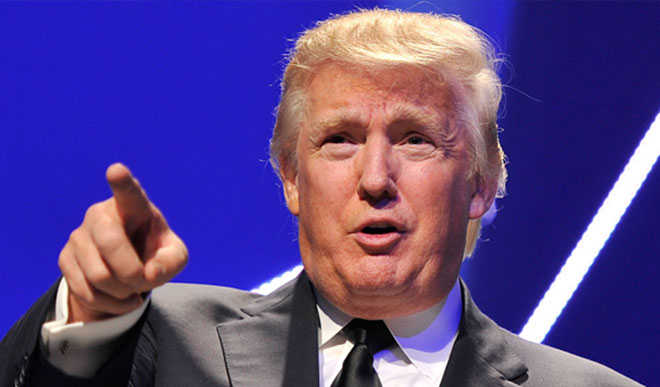How Trump ‘Rick-rolled’ the media
Donald Trump’s renouncement of his baseless claim that President Obama was not born in the US has made headlines – and prompted self-reflection in the media. What would have been a low point in any other presidential campaign may have worked to Mr Trump’s advantage, and raised questions over whether conventional reporting can capture an […]


Donald Trump’s renouncement of his baseless claim that President Obama was not born in the US has made headlines – and prompted self-reflection in the media.
What would have been a low point in any other presidential campaign may have worked to Mr Trump’s advantage, and raised questions over whether conventional reporting can capture an unconventional candidate.
Here is what the US media said about Mr Trump’s announcement.
‘We got Rick-rolled’
US networks were expecting Mr Trump to comment on the birther row and several carried the event live as it began in Washington just after 1100 local time on Friday.
Twenty minutes later, there had been no comment from Mr Trump. Instead, viewers saw a succession of military figures voice support for the Republican, in what was effectively a campaign advert.
Then, after falsely accusing rival Hillary Clinton of starting the birther controversy, he said: “President Barack Obama was born in the United States. Period.”
“We all got Rick-rolled,’’ said CNN’s Jake Tapper, referring to the meme of replacing an expected link online to a video of Rick Astley’s Never Gonna Give You Up.
‘Brilliant move’
For Townhall editor Katie Pavlich it was his “most brilliant campaign move yet”.
In finally admitting that Barack Obama was indeed US-born, Mr Trump made “those desperately waiting for his statement look like fools” she wrote in an article approvingly re-tweeted by Mr Trump.
TV news ‘must stop playing the stooge’
Margaret Sullivan turned her fire on TV news, saying it had played into Mr Trump’s hands.
“Meanwhile, as if to illustrate in caricature the differences in the candidates’ styles – and relative success with the media – the Democratic nominee was doing something unexciting, substantial and workmanlike: addressing the Black Women’s Agenda Symposium,” she wrote in the Washington Post.
“It got, of course, only a fraction of the media’s attention.”
She added: “With public trust in the media at an abysmal low, it’s time – long past time – for TV news outlets to stop playing the stooge for Trump.”
‘War on truth’
For Dan Gillmor, writing in the Atlantic, journalists need “stronger tactics to fight back against the war on truth that Trump and so many others have been waging this year”.
He warns that the media are being “played for suckers by manipulators whose propaganda skills are vastly better than journalists’ apparent ability to do their jobs”.
When candidates lie, he says: “Don’t publish the lie. Do explain what topic the candidate was addressing. Explain that the candidate was lying. Tell the truth about that topic. Or ignore it entirely.”
Media ‘spreading Trump’s narrative’
In Vox, Libby Nelson attacks reporting of Mr Trump’s renouncement, pointing to his lack of acknowledgement he has been pushing the birther theory and his attempt to blame Mrs Clinton.
“This is what people mean when they complain about how ‘the media’ has covered the Trump campaign,” she wrote.
“By trying to avoid bias, some reporters and editors end up spreading the narrative that Trump wants voters to hear.”
Frequently, she says, reporting has failed to adjust from when Mr Trump’s campaign lays out an expectation – in this case that he would make a major announcement on President Obama’s birthplace – to when Mr Trump delivers something different.
Tensions with campaign
One problem for media is access: Mr Trump’s campaign has previously blacklisted reporters from major news outlets for critical coverage, and tensions again emerged on Friday.
After his making his comments, Mr Trump invited TV networks’ pool camera – which provides footage for multiple channels – to tour his hotel in Washington.
Reporters, however, were barred. The designated pool reporter, ABC News producer Candace Smith, said she was “blocked” from following the camera.
The networks collectively agreed not to use the pooled footage in protest.
“The TV pool traditionally doesn’t participate in events that our reporters or producers are not allowed to attend,’’ said Bryan Boughton, Fox News Washington bureau chief and current chairman of the TV pool.
